Not too long ago, chatbots had a reputation for being clunky, impersonal, and frustrating to use. But chatbot technology has evolved quickly, especially with the rise of generative AI over the past few years.
Today’s chatbots can handle transactional tasks like tracking orders, answering questions, and giving shoppers the quick help they expect. When used thoughtfully, ecommerce chatbots can enhance the customer experience and give busy support teams more time to handle complex, empathy-driven conversations.
In this guide, we’re going to look at the seven best ecommerce chatbots on the market, explore some of their key features, and discuss the best ways to use chatbots in ecommerce.
What is an ecommerce chatbot?
An ecommerce chatbot is a tool that uses either pre-programmed rules or artificial intelligence (AI) to interact with customers in real time. They help online retailers and brands provide instant support, answer questions, recommend products, and guide customers to complete a purchase.
Chatbots take ecommerce live chat to a new level by providing self-service support for less complex and more routine inquiries, giving customers instant access to help around the clock.
Chatbots have been used in business since the mid-2000s, but with advancements in natural language processing and machine learning, they’ve become far more conversational, personalized, and capable of handling customer interactions in a way that delivers a great experience.
There are two main types of chatbots: rule-based and AI-powered.
Rule-based chatbots follow a scripted decision tree to guide users through specific questions and answers. These rules are predefined by a human, and the bot will only do what it is instructed to do.
AI-powered chatbots use natural language processing (NLP), machine learning (ML), and generative AI to understand questions, personalize responses, and continuously improve over time. These bots are not pre-programmed to follow certain rules. Instead, they use AI to “interpret” a customer’s inquiry and identify the best response.
AI-powered chatbots have become more common due to their flexibility, scalability, and ability to constantly learn and improve. However, rule-based chatbots are still used regularly for simpler, cost-effective use cases.
Ways ecommerce teams use chatbots
Chatbots are used by ecommerce businesses to both sell products and support customers.
You can find them embedded across multiple touchpoints in the customer journey.
While they’re most commonly seen on a brand’s website, you’ll also find them on messaging apps like Facebook Messenger, WhatsApp, and Instagram, where chatbots can answer product questions and even help complete sales transactions.
Here are some of the most common ways ecommerce teams use chatbots today:
Instantly answering customer questions about products, shipping, and returns.
Recommending products based on browsing behavior and past purchases.
Recovering abandoned carts by reminding shoppers to complete purchases.
Tracking orders and providing delivery updates promptly.
Collecting feedback and survey responses post-purchase.
As with other industries, ecommerce brands also use chatbots to effectively route complex questions to human agents when needed.
The benefits of ecommerce chatbots
There are many benefits of implementing an ecommerce chatbot for your online store, including the following:
24/7 availability: Chatbots can work for you while you’re sleeping, giving customers faster responses.
Lower support costs: Chatbots are great at handling routine inquiries, giving your support team more time to handle complex issues and work on other projects.
Improved customer satisfaction: Fast resolution times are closely tied to customer satisfaction, because your customers don’t want to wait. An effective chatbot experience feels effortless and seamless, enabling you to delight customers at scale.
Increased sales and conversion rates: Chatbots can guide shoppers with timely product suggestions and instant answers, reducing friction and driving more purchases.
Scalable support during high-traffic periods: Chatbots can handle hundreds or thousands of inquiries simultaneously, making them ideal for high-volume sales events like holidays or sudden traffic spikes.
Key features to look for in an ecommerce chatbot
Not all chatbots work the same, and some are better for ecommerce than others. When evaluating ecommerce chatbots, you’ll want to make sure you look for platforms that offer the following features.
CRM and ecommerce platform integrations: Enables personalized and contextual conversations. Integrations should include tools like Shopify and WooCommerce.
Natural language processing: Helps the chatbot understand and respond to customer inquiries accurately and conversationally.
Omnichannel messaging: Lets customers interact across channels, including off-site platforms like Facebook Messenger and WhatsApp.
Human handoff functionality: Ensures trickier issues are smoothly transferred to live agents when needed.
Reporting and analytics: Tracks performance and customer behavior to optimize chatbot effectiveness.
Customer branding and design flexibility: Maintains brand consistency and builds trust in the customer experience.
Multi-language support: Expands accessibility and improves service for global or multilingual audiences.
The 7 best ecommerce chatbots
If you have an ecommerce business and are considering implementing a chatbot, one of the seven ecommerce chatbots below will help you provide better support and increase sales around the clock.
1. Help Scout – Best for human-centric support with smart automation
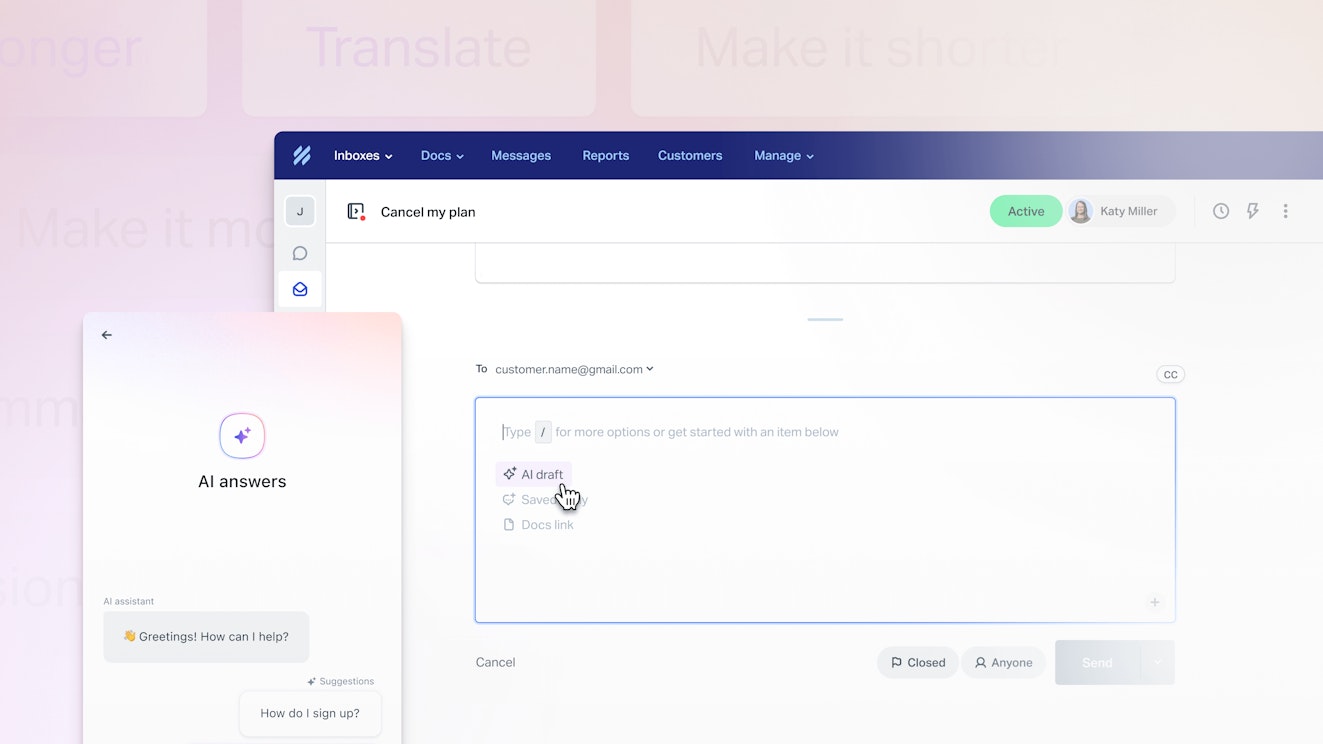
Help Scout is an easy to use and affordable customer support platform that's used by businesses of all shapes and sizes. Ecommerce businesses love Help Scout for its ability to offer a personalized and human-centric support experience across multiple channels (email, chat, and social), all with the support of cutting-edge technology like AI.
Help Scout’s AI tools and live chat features make it a great choice for ecommerce teams that prioritize high-quality, personalized support, alongside self-service options. With proactive messaging and a built-in knowledge base, Help Scout allows you to scale support while maintaining that important human touch.
With integrations for Salesforce and other CRMs, along with ecommerce platforms like Shopify, Help Scout allows support teams to delight shoppers through better, faster support.
AI Answers
Help Scout’s AI Answers gives customers instant responses around the clock. Powered by OpenAI, it sits on top of Beacon, Help Scout’s multi-purpose web widget, and taps into your existing Help Scout knowledge base to draft human-like responses to customer questions. You can also have AI Answers reference any publicly available website to get additional information.
AI Answers can be set to self-service mode, where visitors see AI responses first with the option to escalate, or neutral mode, which shows AI alongside Docs and contact options to reach a human. This flexibility lets you tailor how customers interact with support.
![Beacon w/AI Answers [in-line blog image]](https://hs-marketing-contentful.imgix.net/https%3A%2F%2Fimages.ctfassets.net%2Fp15sglj92v6o%2F6bMVB10h9vl9FNFyZjKgur%2F89f4d46a9271fda1946b2eed323aaa7e%2Fimage1.png?ixlib=gatsbySourceUrl-2.1.3&auto=format%2C%20compress&q=75&w=873&h=582&s=468926b8c2b414c39871cf1b2bbb50f2)
You can easily describe the voice and tone you want AI Answers to use when customers engage with it, ensuring even automated responses align with your brand.
When you turn on AI Answers, you’ll see a new section in Help Scout’s reporting dashboard showing the number of contacts it helped, the number of contacts it didn’t help, and how many times a visitor chose to chat with a human instead. These simple but powerful metrics give you a sense of how AI Answers is performing and indicate areas you might need to tweak.
Because AI Answers is an extension to Beacon, you have full flexibility in the design and can even offer multilingual support. This means that if a shopper reaches out in Spanish, AI Answers knows to respond in Spanish.
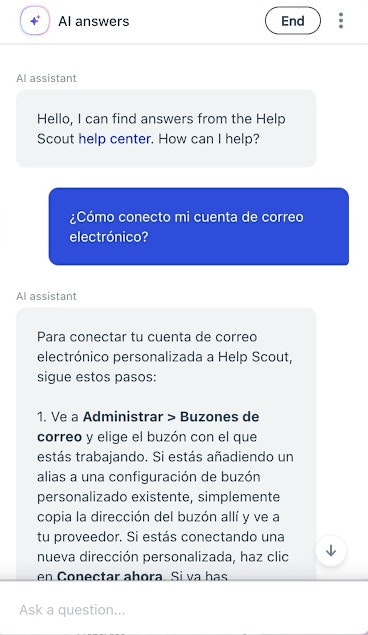
Key ecommerce features
Beacon live chat widget for real-time support and proactive messaging to shoppers.
Self-service support via integrated knowledge base articles inside the chat widget.
Ecommerce and CRM integrations for customer data and order history.
Reporting and analytics to measure chatbot performance.
AI writing assistant to help with spelling, grammar, style, and translation.
AI-drafted email replies based on past conversations and Docs content.
Automated workflows to assign conversations by team, issue type, or customer segment.
Pricing
Free plan and trial available. View Help Scout's current pricing.
Learn more about Help Scout:
2. Tidio – Best for SMBs focused on growth through conversational support
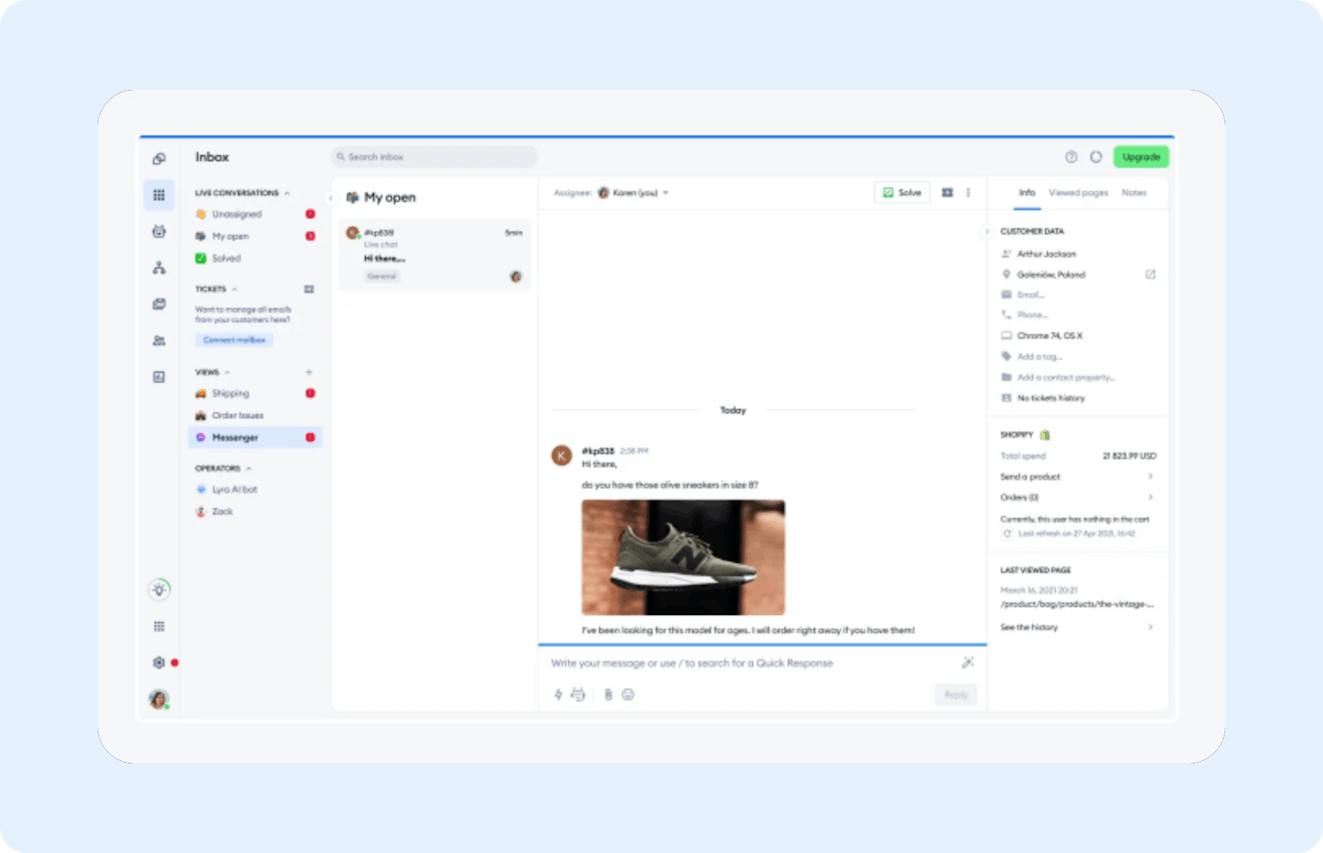
Tidio combines live chat, AI chatbots, and help desk tools into a single platform. You can connect Tidio to Shopify and other major ecommerce platforms to trigger automated workflows based on customer actions.
Tidio’s chatbot, Lyro, helps ecommerce teams deliver a better customer experience by answering product FAQs instantly. Lyro’s answers are based solely on the information you provide, such as the information in your knowledge base, which helps reduce wrong answers. Finally, if customers want to step away from the chatbot experience, Lyro can alert your team so that a real agent can step in.
Another great Tidio feature for ecommerce businesses is the “flows” feature. With flows, your support and sales teams can quickly create pre-designed engagement touchpoints for cross-selling, generating urgency, and conducting post-purchase outreach.
Wondering what that looks like in practice? Imagine being able to reduce cart abandonment rates and increase average order value by recommending products based on context, price, and season from any page in your shop — flows can do that.
Key ecommerce features
AI chatbot, powered by Claude and in-house models, to provide instant answers to customer questions.
Prebuilt ecommerce chatbot templates for cart recovery, product recommendations, and order tracking.
Product recommendations.
Ecommerce integrations for syncing products, orders, and customer data.
Chat triggers based on user activity.
Pricing
Free trial available. View Tidio's current pricing.
3. ManyChat – Best for automating B2C sales on social channels
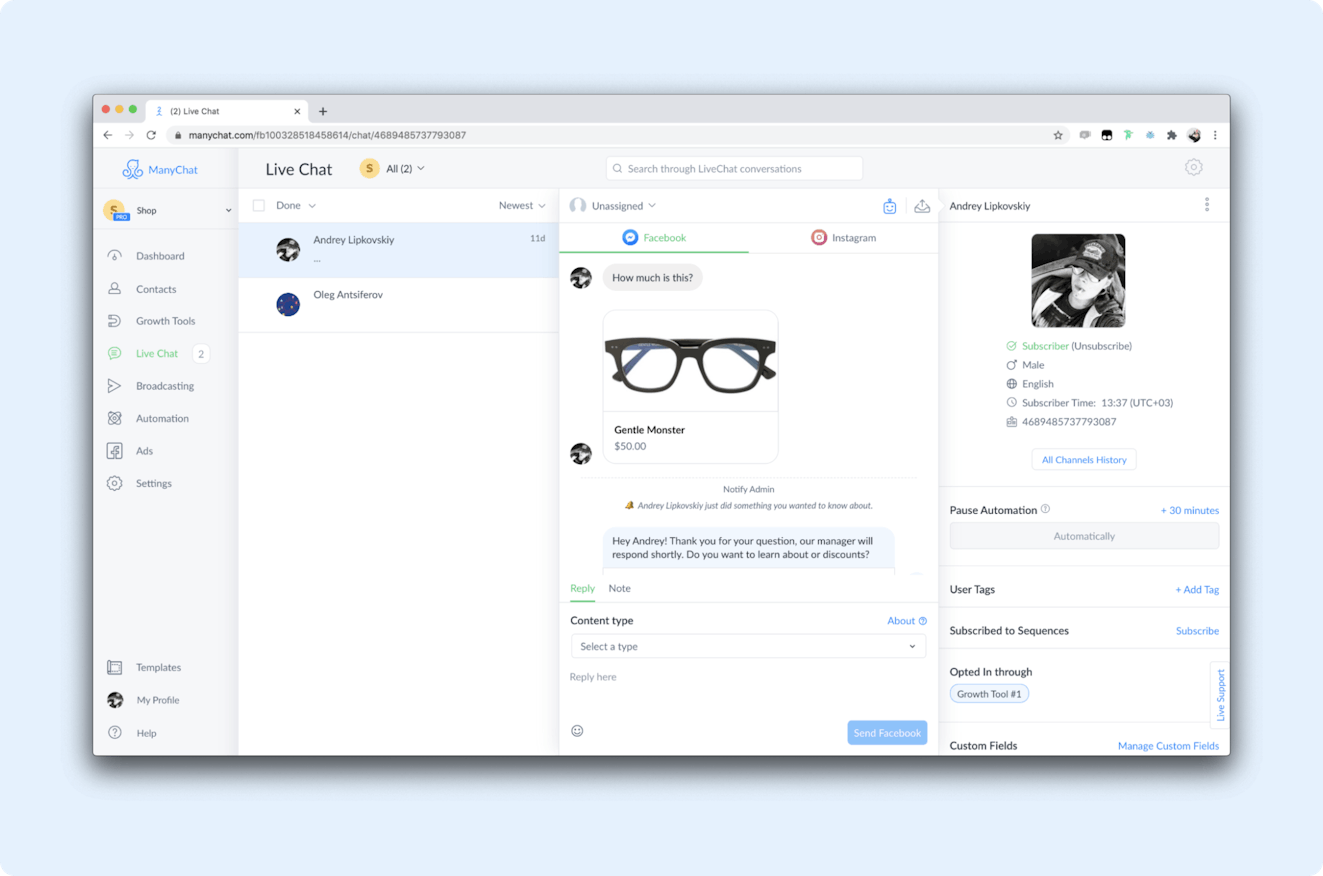
ManyChat specializes in helping ecommerce brands grow their businesses through direct interactions using Facebook Messenger, Instagram, TikTok, and WhatsApp. While the platform does offer the ability to provide live chat support across Facebook Messenger, Instagram DM, and SMS, their main focus is automation via rule-based or AI-powered chatbots.
On the rule-based side of things, their visual no-code builder makes it easy to get up and running with automated workflows to assist sales, support, and lead generation.
For those looking for an AI-enhanced experience, the platform also offers features that can handle multilingual support, provide responses based on customer intent, and writing assistants to help you punch up and improve your copy. There is also an AI flow builder which will let you explain what you’re trying to do in plain language and build the flow for you or offer advice on what could make existing flows better.
With deep integrations into platforms like Shopify and built-in analytics, brands can use ManyChat to track performance and optimize campaigns in real time, ensuring their chatbots are fine-tuned and delivering real results.
Finally, its social-first approach gives digital businesses an opportunity to tap into high-converting channels, meeting customers where they already spend time. It’s especially useful for direct-to-consumer brands, influencers, and small teams looking to scale conversations across social platforms.
Key ecommerce features
Rule and AI-based chatbots via Facebook Messenger, Instagram DM, and WhatsApp.
Visual chatbot builder to customize flows.
Customer segmentation using tags.
Automated coupon delivery based on user actions.
Instant order status updates.
Shopify integration to sync products and orders.
AI features that can improve text, aid in multilingual support, and provide insight into customer sentiment and intent.
Pricing
Free plan available. View Manychat's current pricing.
4. Gorgias – Best for automating ecommerce support with enriched real-time order data and customer profiles
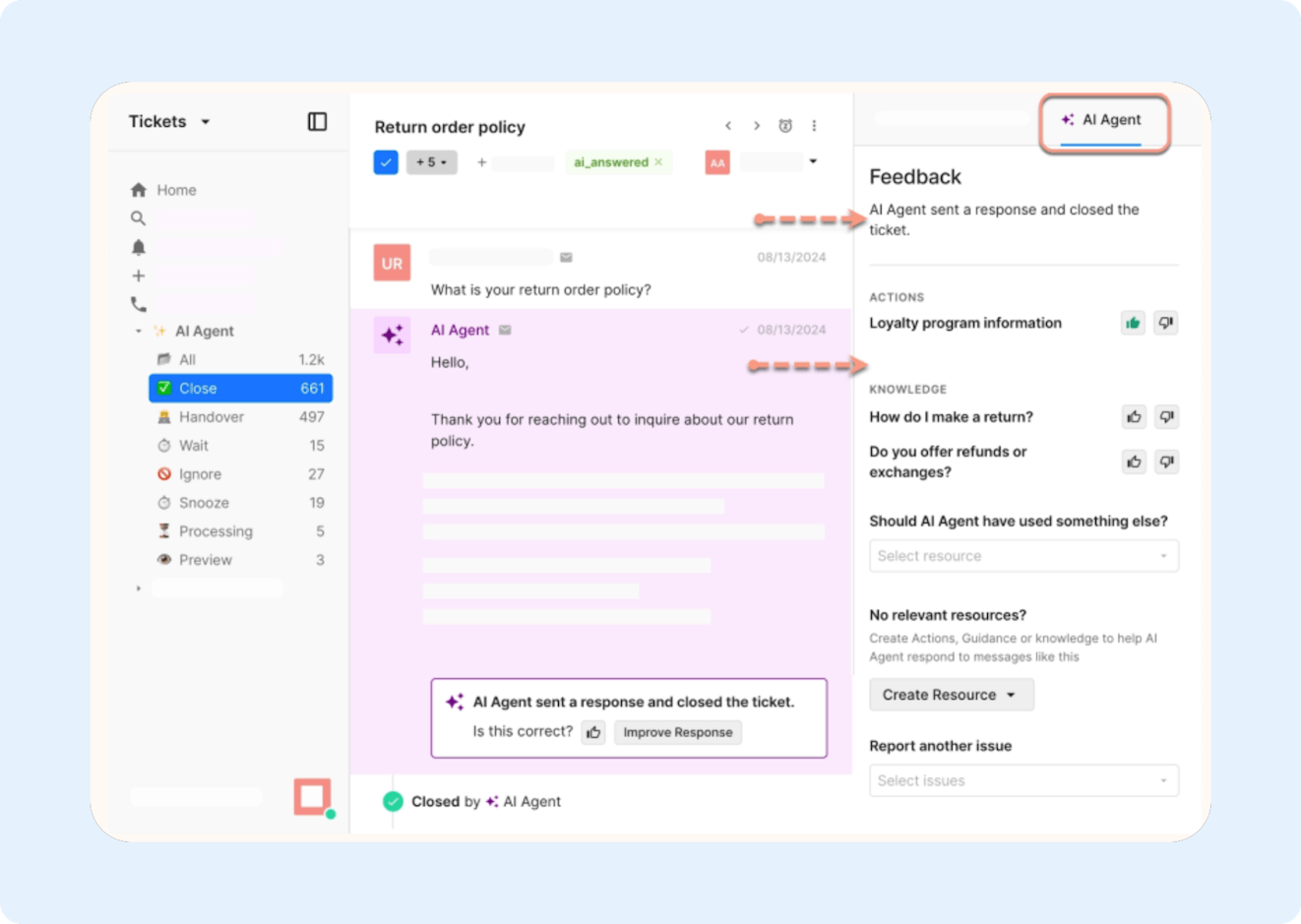
Built specifically for ecommerce, Gorgias pulls in customer and order data from major ecommerce platforms like Shopify and BigCommerce to create highly contextual chatbot interactions. Its chatbot automates common questions and gives agents tools to respond faster when human help is needed.
Gorgias’ chatbots help ecommerce stores drive revenue by acting as virtual shopping assistants, offering product recommendations, answering customer questions, and guiding shoppers through checkout and other key touchpoints.
Gorgias also centralizes customer communication by bringing together messages from email, live chat, SMS, and social media into one unified help desk. This omnichannel approach helps support teams maintain consistency while letting shoppers reach out for help from any channel.
Gorgias is solely focused on the ecommerce space, making it unique among the platforms on this list.
Key ecommerce features
Automated responses for common ecommerce questions (e.g., “Where is my order?”).
AI-powered intent and sentiment detection to prioritize and route tickets.
Rule-based workflows for refunds, cancellations, and shipping updates.
Proactive chat campaigns based on customer behavior.
Agent performance analytics.
Deep integrations with ecommerce platforms like Shopify.
Pricing
Free trial available. View Gorgias' current pricing.
5. Zendesk – Best for large, complex ecommerce customer service
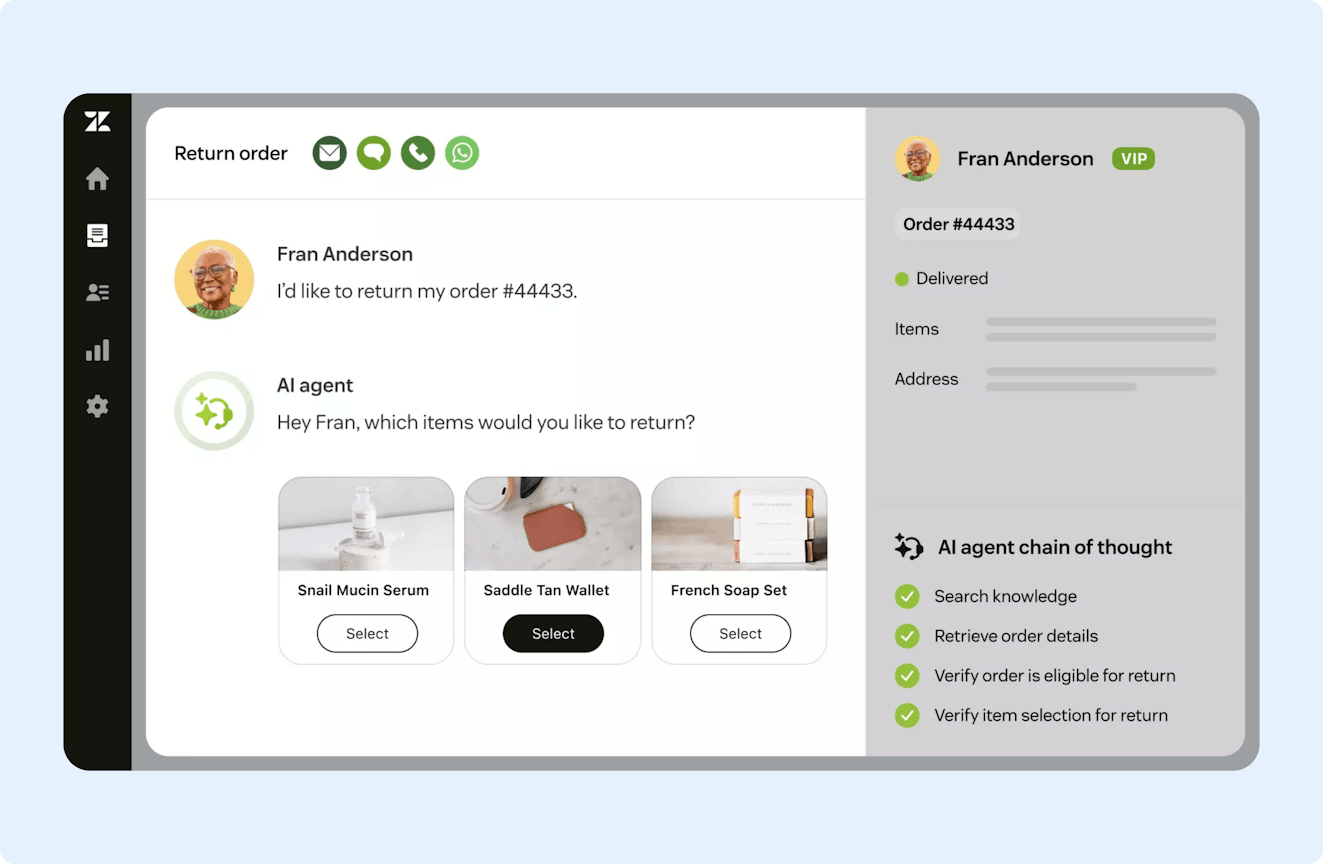
Zendesk is a well-established help desk platform that offers powerful AI, automation, and chatbot capabilities. Its tools are built for large ecommerce and retail operations that need to manage high volumes of support tickets across channels like chat, email, messaging apps, and more.
With Zendesk’s AI Agents, you can have AI handle common questions around order status, shipping updates, and product availability, all while keeping your human agents in the loop.
AI Agents pull directly from information in your help center, from customer profiles and purchase history synced from ecommerce integrations, and from prior tickets, ensuring responses are accurate and personalized.
Zendesk also makes it easy to measure chatbot performance using their robust reporting dashboard, and it even allows you to monitor AI resolutions in real time to ensure quality and a good customer experience.
When it comes down to it, the best thing about Zendesk is that it’s endlessly configurable. It offers all the bells and whistles to enable your team to operate on a large scale. So if that type of customization and infrastructure is something your team needs, Zendesk is a solution that should be on your shortlist.
Key ecommerce features
Chatbots driven by generative AI to manage common questions like order and shipping updates.
Integrations with Magento, Shopify, and other major ecommerce platforms.
Multichannel support (live chat, social messaging, email, voice).
Performance dashboards.
Pricing
Free trial available. View Zendesk's current pricing.
6. Intercom – Best for personalized, AI-driven customer engagement
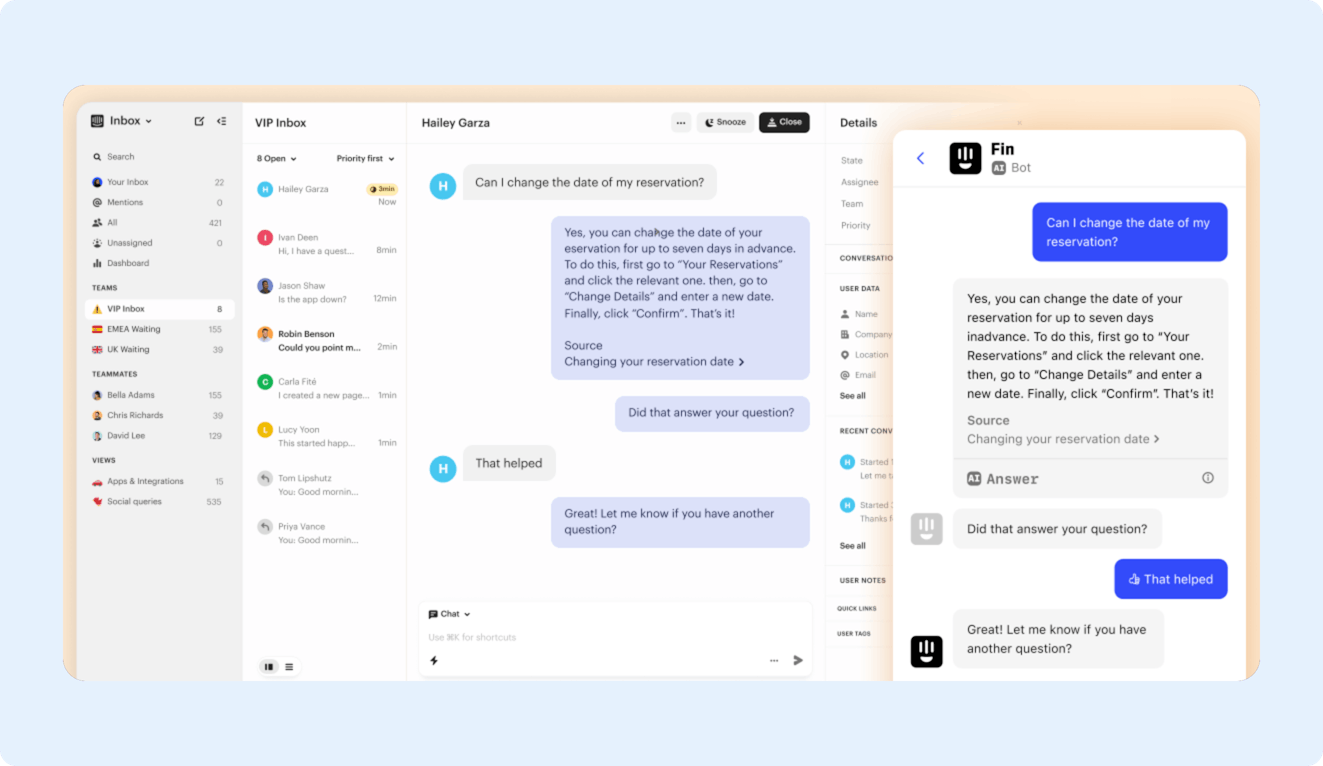
Intercom blends AI, live chat, and automation with a sleek, modern interface. It’s ideal for ecommerce companies that want to personalize interactions at scale. Fin, Intercom’s AI agent, handles support requests automatically, while its outbound messaging and in-app chat tools help drive conversion and retention.
Fin uses multiple data sources to find answers, including Intercom docs, PDFs, content from conversations, and information from any public URL. Ecommerce teams can put Fin to work across a range of channels such as live chat, email, voice, messaging apps, social, and Slack.
Ecommerce brands can use Fin’s behavioral triggers to send targeted messages, such as cart reminders, product tips, or post-purchase follow-ups. Intercom also supports automated workflows that guide shoppers through product selection, checkout, and support.
Key ecommerce features
Seamless integrations with Shopify, Stripe, and more.
Track orders, process refunds, manage product exchanges, and provide real-time updates on shipping status and delivery times all from within Intercom.
Targeted promotions to provide offers to a specific segment of customers.
Real-time product availability and location updates.
Cart recovery and promotional campaign flows.
Pricing
Free trial available. View Intercom's current pricing.
7. Chatfuel – Best no-code chatbot for Facebook and Instagram
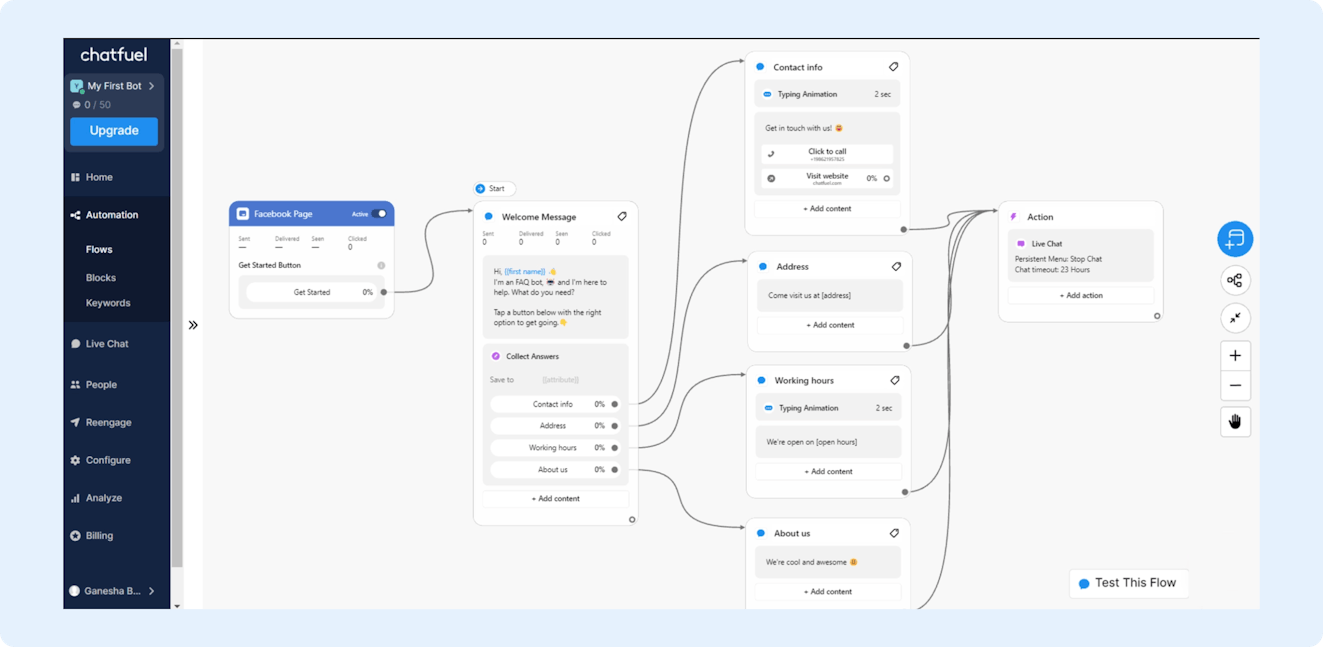
Chatfuel is a no-code chatbot builder primarily focused on Facebook Messenger, Instagram, and WhatsApp. It’s a great ecommerce chatbot solution for brands selling directly through social platforms.
Its visual interface makes it easy to configure and launch product flows, handle FAQs, and automate engagement without any coding or technical experience. Ecommerce brands can set up automated flows for abandoned cart recovery, order tracking, product recommendations, and even secure checkout links.
Using keyword triggers, audience segmentation, and integrations with Shopify and other ecommerce tools, Chatfuel’s chatbot enables businesses to deliver fast, personalized experiences that boost conversions and reduce manual workload across high-traffic channels.
Key ecommerce features
Templates for product recommendations, cart reminders, and order updates.
Automated messaging in Instagram, Facebook, and WhatsApp.
Shopify integration for syncing product and customer data.
Analytics to monitor conversations and user actions.
Pricing
Free trial available. View Chatfuel's current pricing.
Best practices for implementing an ecommerce chatbot
Once you’ve researched ecommerce chatbots and decided which one to go with, you need to be strategic about how you implement it. Follow these tips for success:
Define clear goals. Establish the main objectives for rolling out an ecommerce chatbot. Have clear and measurable goals.
Prepare and train your support team. Set expectations on what to expect, and reassure them that the chatbot will help them do their jobs better. Train them on any new tooling or workflows for continued success.
Start with your most common questions. Look at past support ticket data or FAQs to train your chatbot to handle routine inquiries.
Combine automation with human support. Set clear handoff rules so the chatbot can escalate complicated or sensitive conversations to live agents at the right time.
Personalize conversations. Use customer data like order history, cart status, or location to tailor responses and improve engagement.
Don’t try to automate everything. Human support is still vital to ecommerce success, as chatbots can’t handle complex issues. Start with a few key use cases, such as order status and FAQs, and expand from there.
Test and optimize regularly. Track chatbot performance (resolution rate, bounce rate, etc.), and adjust scripts or flows based on real user behavior.
Chatbots are a strategic play for ecommerce brands
Chatbots aren’t just a support shortcut; they’re a long-term strategy for ecommerce growth. Choosing the right ecommerce chatbot is imperative as it directly impacts your customer experience and how your team operates.
When implemented thoughtfully, ecommerce chatbots can reduce ticket volume, increase conversion rates, and create a smoother customer journey, from browsing products to completing purchases.







